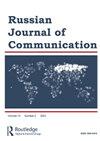Intelligentsia exhumed: nationalist trends among contemporary Russian intelligentsia
Q1 Social Sciences
引用次数: 1
Abstract
Since the late 1980s, we witnessed vigorous attempts to bury the Soviet intelligentsia along with Soviet literature. Some efforts along these lines were truly inspired (Anninsky, 1992; Yampolsky, 1991). And yet, forecasts about the imminent demise of Russian intelligentsia have proved premature. Plenty of people still identify themselves with this vaunted group. Some go out of their way to sell their services to the official authorities, to Vladimir Putin – the surprising monarch that emerged after breakup of the Soviet Union. Others, still in self-criticism mode, agitate against the reigning powers and official establishment or sport a decidedly apolitical attitude. Then there are those who enjoy a cozy relationship with the establishment and milk it to their advantage. Structurally, the situation uncannily resembles the one that prevailed in the Soviet era (Beyrau, 1993). The notion that the intelligenty will transform themselves into pragmatic intellectuals – a common assumption in the 1990s – didn’t pan out (Kordonsky, 1994). The intelligentsia is still very much with us, even though it has adapted to the circumstances. It’s been at least a hundred-fifty years since basic literacy has secured a foothold in Russia, but the conflict between faith and reason continues unabated. And the feeling appears to be winning over the intellect. In1866, Tyutchev memorably quipped that you cannot fathom Russia without applying its unique measuring rod – arshin – which almost no one of my acquaintances is able to identify with any precision. Hence, the continued befuddlement on the part of those trying to understand Russia and its intelligentsia in rational terms. That Tyutchev formula – ‘Reason fails those who seek to fathom Russia’ – still rules the day can be gleaned from the political slogan made popular in the 1996 election, ‘Vote with your heart.’ There is a kind of self-serving condescension lurking behind the tired wisdoms of intelligenty: ‘If you have to explain, you have already failed,’ ‘You’ve got to figure this out on your own,’ ‘People won’t understand if we attempt this.’ Do nothing, however, excuse your idleness as virtue, and people will not only understand but also sympathize with you. The intelligenty are more likely to get a pass for its feeblemindedness amidst the harsh realities of Russia. Don’t they love their poor country and its people? That alone should have dissuaded Lenin from complaining to Maxim Gorky that the intelligentsia ‘is not the nation’s brain but the nation’s shit’ (Lenin, 1919/1970).发掘出的知识分子:当代俄罗斯知识分子中的民族主义趋势
20世纪80年代末以来,我们目睹了埋葬苏联知识分子和苏联文学的强烈企图。沿着这条路线的一些努力确实受到了启发(Anninsky, 1992;Yampolsky, 1991)。然而,事实证明,关于俄罗斯知识分子即将消亡的预测还为时过早。很多人仍然认为自己属于这个自吹自擂的群体。有些人特意向官方机构出售他们的服务,向弗拉基米尔·普京——苏联解体后出现的令人惊讶的君主。还有一些人仍处于自我批评的状态,他们煽动反对当权者和官方机构,或者表现出坚决不关心政治的态度。还有一些人喜欢与当权派保持舒适的关系,并利用这种关系为自己谋利。从结构上看,这种情况与苏联时代的情况惊人地相似(Beyrau, 1993)。知识分子会将自己转变为务实的知识分子——这是20世纪90年代的一个普遍假设——并没有实现(科尔顿斯基,1994)。尽管知识分子已经适应了环境,但他们仍然和我们在一起。在俄罗斯,基础扫盲已经站稳脚跟至少150年了,但信仰与理性之间的冲突仍在继续。感觉似乎战胜了理智。1866年,秋切夫曾说过一句令人难忘的俏皮话:如果不使用它独特的测量杆——阿尔辛,你就无法了解俄罗斯,而我的熟人中几乎没有人能精确地识别出它。因此,那些试图理性地理解俄罗斯及其知识分子的人一直感到困惑。从1996年大选中流行起来的政治口号“用心投票”中可以看出,丘契夫公式——“理性会让那些试图了解俄罗斯的人失望”——仍然占据主导地位。在那些令人厌烦的智慧背后,隐藏着一种自私自利的优越感:“如果你还得解释,你就已经失败了”、“你必须自己搞清楚”、“如果我们这么做,别人是不会理解的”。什么也不要做,把你的懒惰当作美德,人们不仅会理解你,而且会同情你。在俄罗斯严酷的现实中,聪明的人更有可能因为他们的软弱而获得通行证。难道他们不爱他们贫穷的国家和人民吗?单凭这一点,列宁就不应该向马克西姆·高尔基抱怨知识分子“不是国家的大脑,而是国家的屎”(列宁,1919/1970)。
本文章由计算机程序翻译,如有差异,请以英文原文为准。
求助全文
约1分钟内获得全文
求助全文
来源期刊

Russian Journal of Communication
Social Sciences-Political Science and International Relations
自引率
0.00%
发文量
0
期刊介绍:
Russian Journal of Communication (RJC) is an international peer-reviewed academic publication devoted to studies of communication in, with, and about Russia and Russian-speaking communities around the world. RJC welcomes both humanistic and social scientific scholarly approaches to communication, which is broadly construed to include mediated information as well as face-to-face interactions. RJC seeks papers and book reviews on topics including philosophy of communication, traditional and new media, film, literature, rhetoric, journalism, information-communication technologies, cultural practices, organizational and group dynamics, interpersonal communication, communication in instructional contexts, advertising, public relations, political campaigns, legal proceedings, environmental and health matters, and communication policy.
 求助内容:
求助内容: 应助结果提醒方式:
应助结果提醒方式:


